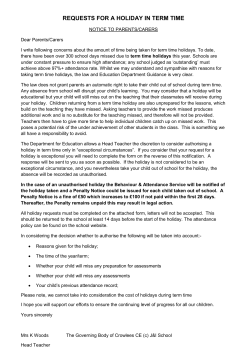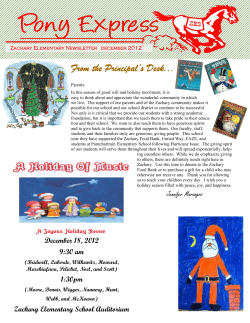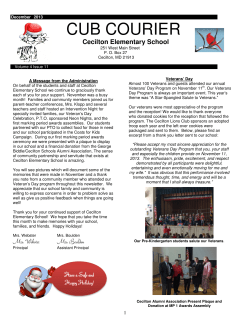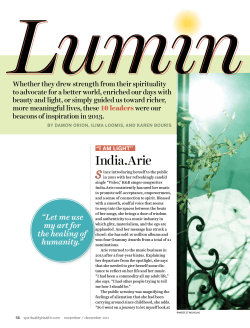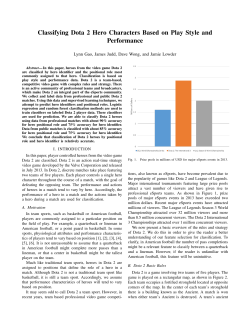
“BILLIE HOLIDAY AS SPIRITUAL GUIDE” Rev. Don Rollins February 3, 2008
“BILLIE HOLIDAY AS SPIRITUAL GUIDE” Rev. Don Rollins February 3, 2008 INTRODUCTION One of the reasons some newcomers find Unitarian Universalism confusing is that it’s designed around process, not content; liberal religion is the scaffolding for building, testing and living one’s faith. It’s not a prefabricated house. Our primary purpose for being is not to peddle unexamined faith. We’re here to be one resource among many, not an endall or beall. That’s why we don’t try to be all things to all people. But even good ideas have their drawbacks. For me, the most daunting consequence of our way of religion is that we have no central story, and thus no single hero. No creation story. No deliverancefromenemies story. No epiphany story. No resurrection story. And no Abraham, Buddha, Jesus or Muhammad. Not even a Mother Teresa or Martin Luther King, Jr. or Dali Lama. We can claim pieces of the stories, aspects of the heroes, but never in total. For us, life and religion are too big and too fluid to put stock in one story and one hero. And so it is that we are always on the lookout for stories and heroes that inspire us. They need not be divine, for we’re not looking to be saved. They need not be perfect, for we’re not interested in making an idol who speaks for us but not to us. Heck, often as not, we’re drawn to stories and heroes that involve tragedy as well as comedy, agony as well as ecstasy. The four African Americans I’ve chosen to talk about as we mark Black History Month 2008 had their fair share of tragedy and agony. Each was gifted – so gifted that they used their gifts to transcend various forms of racism and, in the case of today’s sermon, sexism, too. My aim for these three sermons on famous black personalities is not to suggest that we can fully enter their psyches and spirits; white people, as evidenced again and again, cannot get inside the experience of being black in America. Likewise, men, we can only speculate about what it’s like to be on the other end of nearly twoandahalf centuries of gender discrimination. My aim is to lift up their unique struggles, offering them as stories and heroes worthy of all of us, black, white or otherwise. My aim is to suggest that Billie Holiday, Jackie Robinson, Larry Doby and Jimi Hendrix are worthy spiritual guides, human frailties and all. ELEANORA FAGAN Eleanora Fagan was born into the abject poverty of 1915 black Philadelphia, but spent most of her childhood in Baltimore. Frankly, historians know about 1 as much about Jesus’ missing years as young Eleanor, so fuzzy are the details about that period of her life. And what we do know is not very pleasant. Sadie Fagan, Eleanora’s mother, was barely 13 when she gave birth. Although it’s not certain that her fifteenyearold, jazz guitarist father, Clarence Holiday, was ever married to Sadie Fagan, it’s certain that they never lived together for more than a few months. It’s certain that her maternal grandfather was one of seventeen children born into Virginia slavery. And it’s certain that her great grandfather was a white, Irish plantation owner. Sadie, Eleanora’s mother, was turned out of her parents’ home once they learned she was pregnant. Sadie went to Philadelphia until Eleanora was born, then returned to Baltimore. We know little about Eleanora’s childhood save that she dropped out of school at age 11, reported being raped and was placed in a Catholic reform school. When she exited two years later, she joined her mother in Harlem. Not long thereafter, Sadie walked in as a male neighbor was raping Eleanora. The next time the child was heard from, she had been arrested for prostitution while working at a brothel. Tough start, to say the least. BILLIE HOLIDAY Eleanora was still in her teens when she began making tip money in various black nightclubs. She was 20 when John Hammond, a writer and producer for several black jazz singers, met her. Through Hammond, she began recording with Benny Goodman, Duke Ellington, Count Basie and other bigname artists. Soon, she was recording under her own name. Times were good. And Eleanora became Billie Holiday, combining the name of a popular actress with that of her father’s. Billie Holiday and saxophonist, Lester Young, were the impetus for what jazz critics believe was the golden age of early jazz, from the latethirties until the early forties: “Strange Fruit”, “Fine and Mellow”, “Summer Time”, “Body and Soul” and, of course, “Lover Man”. She sang two duets with Louis Armstrong, and appeared with him in the 1947 film, New Orleans. Times were still good, right? Careerwise, obviously. But behind the career, Billie Holiday had become dependent on heroine and alcohol. She married, had various affairs, divorced, was physically abused and served eight months in a West Virginia prison for women. Holiday married her last husband, Louis McKay, in 1952. He had ties to New York mafia bosses. By the time she reached midthirties, her voice began to register the hard living. But, as with the other setbacks in her life, Holiday adjusted. She learned how add unique nuances to her signing, eventually working her way back to large 2 venues and audiences. She toured Europe. On November 10, 1956, she sang to a full house at Carnegie Hall – a black, middleage female singer with a drug habit and prison record. She finished her last studio recordings in 1959, and her last live concert was given in Greenwich Village, later that same year. Time was running out on Holiday, but not even her friends could convince her to stop the selfabuse. Livers and hearts are not made for the kind of hell that was Billie Holiday’s life. Feeling ill for months prior, she was admitted to a New York hospital. (Six weeks later she was placed under house arrest for possession of illicit drugs.) Police guards were still at her hospital door when cirrhosis took her life on July 17, 1959. She was 44. And broke. SPIRITUAL GUIDES Recall what I said earlier about heroes in the context of liberal religion. Heroes, for us, are neither divine nor perfect. To resurrect an old saw, heroes – spiritual guides, if you prefer – are simply those who get up one more time than they get knocked down. We can relate to them. We know their struggles. And we pull for them as some sort of spiritual solidarity with their quest for wholeness despite brokenness. In his preface to his book, “Beyond Courage: The Nine Principles of Heroism”, Chris Benghue gives us something to think about when we bandy about terms like hero and spiritual guide: Always remember the word lifestyle when referring to heroes. Being a true hero is not a onetime, flashinthepan event…More times than not, heroes have been formed by a lifelong series of difficulties or traumas… But, you might say, doesn’t a hero story have to have a happy ending? Benghue thinks so. Let me read that sentence again, but this time I’ll read it in its entirety: More times than not, heroes have been formed by a lifelong series of difficulties or traumas that have inspired them to look at life differently, change priorities and deepen their perspective on what the purpose of life truly is. It was only those precipitating events that demonstrated to them the power of love, whether they were on the receiving end or the giving end. Just a bit more from Chris Benghue’s book, making it clear that his idea of a hero (spiritual guide) requires a lesson learned, a life redeemed and a positive outcome: Now that newly formed hero is endowed with great strength, endurance, wisdom and inspiration, which enables him to help the world around him in 3 extraordinary ways. Heroes are hopeful and inspiring people who love the world around them in every way they can. The fascinating byproduct of this newfound devotion is that these individuals also reap the greatest and most inexplicable sense of contentment and happiness they have ever known… Ultimately, what lies “beyond courage” is universal joy and peace attained through the proliferation of love. Huh? By this author’s lights, Billie Holiday is nobody’s hero. She’s worse than that. She’s a loser. I don’t buy it. I don’t buy the line that our heroes have to come out redeemed and ready to help other losers become winners. Folks, Jesus was a loser according to the oldest surviving manuscripts; the Resurrection story is contrary to the linguistic, cultural and historical contexts that precede every Gospel account of what happened when Jesus was taken from his cross. So what if the first generations of Christians liked happy endings. We like happy endings, too. But we miss a great deal by insisting that everything comes out hunky dory by the time the prospective hero’s life wraps up. Is the act of staying engaged with one’s shadowself ever enough? Does heroism belong only to those exorcise their demons and redeem themselves? Or might we rethink the archetype of the hero to include those who give change their best shot? Again and again. For my money, Chris Benghue – and all who define the spiritual guide as the one who radiates goodness and light in the wake of some epiphany – are underestimating the moral fortitude required to keep at our issues, problems and lapses of character. Case in point: Billie Holiday. Living in spite of poverty is heroic. Navigating racism and sexism is heroic. Surviving rape is heroic. Channeling into art one’s tortured soul is heroic. Checking into a rehab unit is heroic. Leaving behind a musical catalog that yet today feeds hearts and souls is heroic. Would to God that Billie Holiday were just the jazz singer’s standard of measurement, not the tragic, tortured jazz singer’s standard of measurement. Would that she had never whored, drugged, drank and fought her way through her short life, but that’s not the way things went. So what do the Billie Holidays of past and present have to offer us? How to be resilient despite circumstances no human being should have to face. How to put your stuff out there in the world no matter what. How to reinvent, and 4 reinvent and reinvent oneself. How to stop being a victim. How to stay engaged even when the battle seems lost. The pantheon of the world’s spiritual guides is short on people who didn’t win their struggles, didn’t blaze the trails, didn’t wax eloquent or change clothes in a phone booth. (Just take notice the next time the historical purists get their shorts in a bunch over having to revise their work in light of new knowledge: No contaminating our idolatrous take on history! Jefferson and Sally Hemmings never hooked up. The Union Army never spread smallpox on blankets before trading them to tribe after tribe, nation after nation. Right. And the check’s in the mail…) Spiritual maturity requires that we move beyond the notion of losers and winners when choosing our heroes. We then start letting ourselves and others become more complex, no more onedimensional idols. We start discerning what we do and don’t want to learn from our spiritual guides. We let it dawn on us that God and love and life and death have confounded every thinking person, clayfooted heroes included. Emerson wrote a good deal about what it means to succeed in life. You’ve probably heard the poem that has become popular at many memorials and funerals. Written in his later years, Emerson tells us that success has more to do with children and a garden patch than being perfect according to whatever or whomever. I think Emerson would’ve seen the spirit of Billie Holiday and called it heroic. I really do. One of Billie Holiday’s biographers saw her heroism: During [Billie Holiday’s] lifetime she fought racism and sexism, and in the face of great personal difficulties, triumphed through a deep artistic spirit. It is a tragedy that only after her death could a society, who had so often held her down, realize that in her voice could be heard the true voice of the times. And the essayist, Brian Doyle, though not referring specifically to Billie Holiday, understands this kind of heroism, too: Our hearts are not pure. Our hearts are filled with need and greed as much as with love and grace, and we wrestle with our hearts all the time. How we wrestle is who we are. What we want to be is never what we are… A religious tradition with no single story or hero at its nexus can be mighty confusing, so it’s nothing short of grace to be able to draw from others the strength to keep at our demons. Black History Month is a swell time for looking into some spiritual guides that time and history may have given short 5 shrift. People like Sadie Fagan’s little girl, Eleanor – the one that sang her blues for us. Bless the soul of Billie Holiday. Bless our flawed heroes. Bless us all. 6
© Copyright 2025



